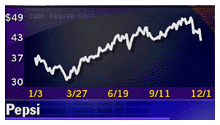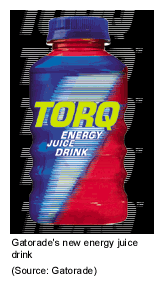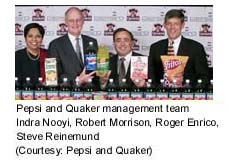|
PepsiCo wins Quaker Oats
|
 |
December 4, 2000: 5:20 p.m. ET
World's No. 2 soft drink maker buys Gatorade parent for $13.4B in stock
|
NEW YORK (CNNfn) - Soft drink maker PepsiCo agreed Monday to buy Quaker Oats Co. for $13.4 billion in stock, ending a month-long courtship to acquire the parent company of Gatorade, the dominant brand in the fast-growing U.S. sports drink category.
The merger is expected to end a roller coaster odyssey for Quaker Oats (OAT: Research, Estimates), which last month also flirted with deals involving such suitors as Coca-Cola Co. and French food conglomerate Groupe Danone before agreeing to wed Pepsi, the world's No. 2 soft drink company.
In addition to significantly bolstering its food and beverage offerings, the purchase of Quaker Oats represents a major coup for Pepsi in its long-running war to gain ground on its chief rival Coke, in the eyes of analysts. With Gatorade, Pepsi will now assume a leadership position in the increasingly important non-carbonated beverage category, the fastest growing segment in the beverage industry, and perhaps for the first time put Coke in a position of looking up at Pepsi.
"Coke is at an increasing disadvantage," said Caroline Levy, beverage analyst with UBS Warburg. "Pepsi is locking up the non-carbonated segment. Coke is dealing with restructuring its internal problems while Pepsi is being proactive about growth."
|

|
VIDEO
|
|
 Steve Reinemund, president and COO of PepsiCo, chats with CNNfn about the deal. Steve Reinemund, president and COO of PepsiCo, chats with CNNfn about the deal. |
|
Real
|
28K
|
80K
|
|
Windows Media
|
28K
|
80K
|
|
The agreement, reached over the weekend, is essentially the same deal the two parties walked away from early last month. Pepsi (PEP: Research, Estimates) intends to swap 2.3 shares of its stock for each outstanding Quaker Oats share. Based on Pepsi's closing price of $42.38 Friday, that values the Chicago-based company at $97.47 per share, or $13.4 billion.
 In addition, PepsiCo will assume about $761 million in Quaker debt, and will receive a breakup fee of $420 million if Quaker calls off the transaction to go with another partner. In addition, PepsiCo will assume about $761 million in Quaker debt, and will receive a breakup fee of $420 million if Quaker calls off the transaction to go with another partner.
Pepsi expects the deal to close in the first half of 2001 and said the transaction would add slightly to earnings during the first full year.
Wall Street applauded the deal as shares of Pepsi rose $1.44 to $43.81, while Quaker Oats jumped $2.44 to $91.06.
"Combining with the world-renowned PepsiCo organization will unleash the tremendous global growth potential of the Gatorade brand and leverage the strengths of our foods business," Quaker Oats Chairman Robert Morrison said in a statement Monday.
The two companies walked away from virtually the same proposal last month after Quaker Oats insisted on a price protection "collar," which would protect its shareholders against a sudden decrease in Pepsi's stock price.
That temporarily left a window of opportunity open for Coke, which initiated merger discussions with Quaker Oats almost immediately. Coke Chairman Douglass Daft nearly sealed a $15.75 billion merger agreement with Quaker Oats two weeks ago, only to watch his board quash the deal at the 11th hour, a move some analysts said may ultimately haunt the world's No. 1 soft drink company.
Is Coke smiling now?
The agreement unveiled Monday does not have a collar. However, if Pepsi shares fall and take the value of the deal to Quaker investors below $92 per share, then Quaker can walk away from the deal without financial penalty. Pepsi's bid is capped at a valuation of $105 per Quaker Oats share.
"I think Quaker realized, hey, Pepsi offered us a pretty good deal, maybe we should go with it this time," said Jennifer Salomon, beverage analyst with Salomon Smith Barney.
PepsiCo President Steve Reinemund told CNNfn his company was very surprised Quaker was not snapped up by a rival after the deal first fell apart. (393K WAV or 393K AIFF)
The deal could raise antitrust concerns because of PepsiCo's ownership of All-Sport, a competing brand to Gatorade, albeit with a much smaller market share, estimated to be around 5 percent. PepsiCo likely would have to agree to divest of its All-Sport holdings as part of any agreement with federal regulators.
"We're ready to do what's required to make this deal work from an All-Sport perspective," Reinemund said.
He said Coke (KO: Research, Estimates) would be an unlikely suitor, given their competing Powerade business, but said Pepsi is confident of finding a buyer if necessary.
In light of the deal, Quaker said Monday it is discontinuing its $1 billion stock repurchase program announced in March 1998.
Hunting the Gator
In a conference call Monday, Pepsi Chairman and CEO Roger Enrico called the deal "one terrific moment in the history of PepsiCo and Quaker."
Enrico said the transaction will increase Pepsi's annual top-line growth to more than 7 percent from 6 to 7 percent and boost annual earnings-per-share growth to 13 to 14 percent from 12 to 13 percent.
 The company was conservative in its estimates of increased growth in Gatorade, but said Gatorade's merchandising and distribution in large and small stores will significantly help its line of Tropicana ambient, or non-chilled beverages such as Tropicana Twister. The company was conservative in its estimates of increased growth in Gatorade, but said Gatorade's merchandising and distribution in large and small stores will significantly help its line of Tropicana ambient, or non-chilled beverages such as Tropicana Twister.
Enrico said Pepsi expects incremental growth of $400 million in the ambient beverage segment by the end of year five.
Gatorade is by far the dominant brand in the $2.5 billion sports drink category, controlling nearly three-quarters of the take-home sales in that market. It joins Pepsi's other non-carbonated offerings, which includes Tropicana juices, Aquafina water, Lipton teas and South Beach Beverage Co., maker of SoBe brand enhanced juices and teas, which acquired in late October.
Though Gatorade has been by far the fastest-growing product in Quaker Oats' broad portfolio -- which also includes Cap'n Crunch cereal and Aunt Jemima syrup -- and now represents roughly 40 percent of the company's overall sales, analysts have long theorized the sports drink could experience even greater growth when combined with a major distribution network like Pepsi's.
"Gatorade would do even better under PepsiCo than it has under Quaker Oats because of better marketing and distribution," said John Sicher, a veteran soft drink industry watcher who publishes Beverage Digest in New York.
But Enrico said the company has not modeled any top-line growth for increased domestic and international penetration for the sports drink.
"I think they were being really conservative," Levy said. "I think there should be some growth from Gatorade."
"Pepsi's strategy for the last three years has been to overshoot the mark [for earnings expectations] and I don't think they want to mess that up," she said.
While picking up Gatorade was seen as the primary thrust of this transaction for PepsiCo, Salomon said several of Quaker Oats' snack food products, including granola snack bars and rice cakes, will nicely complement PepsiCo's line of salty snacks. (456K WAV or 456K AIFF)
Enrico said the company expects to double the growth rate for Quaker's snacks, but said the non-snack business would be "consistent" with predictable earnings.
He stressed the addition of these food businesses does not change Pepsi's concentration on refreshment beverages, enhanced and functional beverages and salty snacks.
Management shuffle
As part of the transaction, Enrico plans to accelerate his previously announced departure and hand over both positions to company president Reinemund when the transaction closes.
"Steve Reinemund is someone Wall Street knows well," Salomon said. "I think the Street's pretty comfortable with him, he's a very disciplined guy, results oriented, sounds like the right guy for the company right now."
 Enrico, who previously had said he would step down as chief executive at the end of 2001 and as chairman the following year, will remain as vice chairman of the board. Enrico, who previously had said he would step down as chief executive at the end of 2001 and as chairman the following year, will remain as vice chairman of the board.
Robert Morrison, Quaker Oats' well-regarded chairman and CEO, also will be a vice chairman of the combined company's board.
PepsiCo's current CFO, Indra Nooyi, will become president and keep her CFO duties. 
|
|
|
|
|
|
Pepsi
Quaker Oats
|
Note: Pages will open in a new browser window
External sites are not endorsed by CNNmoney
|
|
|
|
 |

|

